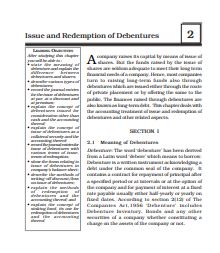‘NCERT Solutions for Class 12 Accountancy Chapter 2‘ PDF Quick download link is given at the bottom of this article. You can see the PDF demo, size of the PDF, page numbers, and direct download Free PDF of ‘Ncert Class 12 Accountancy Chapter 2 Exercise Solution’ using the download button.
NCERT Class 12 Accountancy Textbook Chapter 2 With Answer PDF Free Download

Chapter 2: Issue and Redemption of Debentures
2.1 Meaning of Debentures
Debenture: The word ‘debenture’ has been derived from the Latin word ‘debere’ which means to borrow.
A debenture is a written instrument acknowledging a debt under the common seal of the company.
It contains a contract for repayment of principal after a specified period or at intervals or at the option of the company and for payment of interest at a fixed rate payable usually either half-yearly or yearly on fixed dates.
According to section 2(12) of The Companies Act,1956 ‘Debenture’ includes Debenture Inventory, Bonds, and any other securities of a company whether constituting a charge on the assets of the company or not.
Bond: A bond is also an instrument of acknowledgment of debt.
Traditionally, the Government issued bonds, but these days, bonds are also being issued by semi-government and non-governmental organizations. The terms ‘debentures’ and ‘Bonds’ are now being used interchangeably.
2.2 Distinction between Shares and Debentures
Ownership: A ‘share’ represents ownership of the company whereas a debenture is only acknowledgment of Debt.
A share is a part of the owned capital whereas a debenture is a part of borrowed capital.
Return: The return on shares is known as dividends while the return on debentures is called interest.
The rate of return on shares may vary from year to year depending upon the profits of the company but the rate of interest on debentures is prefixed.
The payment of dividends is an appropriation of profits, whereas the payment of interest is a charge on profits and is to be paid even if there is no profit.
Repayment: Normally, the amount of shares is not returned during the life of the company, whereas, generally, the debentures are issued for a specified period and repayable on the expiry of that period.
However, in the year 1998, the amendments (Section 77A and 77 B sub Section 2) in the Companies Act, 1956 permitted companies to buy back their shares especially when the market value of shares is less than their book value.
| Author | NCERT |
| Language | English |
| No. of Pages | 75 |
| PDF Size | 254 KB |
| Category | Accountancy |
| Source/Credits | ncert.nic.in |
NCERT Solutions Class 12 Accountancy Chapter 2 Issue and Redemption of Debentures
1. What is meant by a Debenture?
A debenture is derived from the Latin word “debate” which translates to borrow. Debentures are not backed by any collaterals. These are issued by governments and corporations to raise funds or capital for long-term borrowing.
2. What does a Bearer Debenture mean?
When records are not maintained for debenture and holders and the debenture can be transferred by delivery, such debentures are known as Bearer Debenture.
These debentures are issued physically on paper and are payable to the bearer of the debenture. These are also called unregistered debentures.
3. State the meaning of ‘Debentures issued as a Collateral Security.
Collateral security refers to an additional layer of security over and above the primary security. It is seen in the case of a company taking a loan from a financial institution, in such cases, the company issues debentures which are additional security or collateral security.
The money lender will not be receiving any interest on these debentures.
In case the company defaults in making payment and the primary security is not sufficient to cover the debt, then debentures can be used for recovering the amount.
4. What is meant by ‘Issue of debentures for consideration other than Cash’?
A company purchases any asset from its vendors or suppliers and issues debentures to them instead of paying in cash.
This process is known as the issue of debenture for consideration other than cash. It helps both the seller and purchaser as the seller gets interested in debentures issued and the purchaser does not need to arrange cash immediately.
Debentures are issued at par, premium, or at a discounted rate to the seller.
5. What is meant by ‘Issue of debenture at a discount and redeemable at a premium?
It may happen that due to challenging market conditions a company has to raise funds from the market by issuing debenture below its par value and to attract investor interest has to offer redeemable value higher than its par value, this is termed an issue of debenture at a discount and redeemable at a premium. The difference that is generated due to such an arrangement is treated as a loss on the issue of the debenture.
Issue and Redemption of Debentures NCERT Textbook With Solutions PDF Free Download
